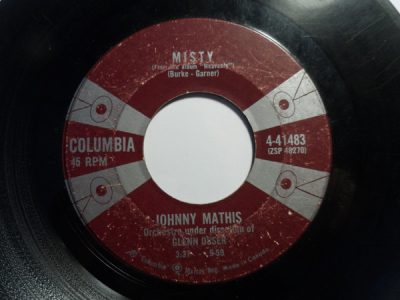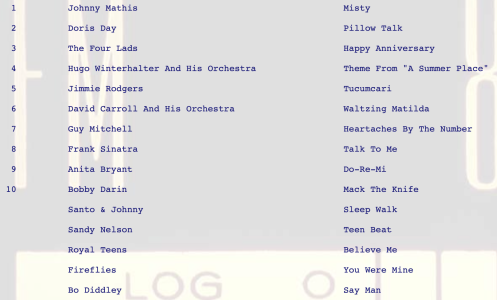#6: Misty by Johnny Mathis
City: Hull, PQ
Radio Station: CKCH
Peak Month: January 1960
Peak Position in Hull ~ #1
Peak position in Vancouver ~ #25
Peak Position on Cashbox Top 100 Best Sellers ~ #12
YouTube: “Misty”
Lyrics: “Misty”
Johnny Mathis was born in Gilmer (TX) in 1935. His family moved to San Francisco when he was 5-years-old. His father was a vaudeville singer and piano player. Mathis began learning songs and routines from his father. Mathis’ first song was “My Blue Heaven”. He started singing and dancing for visitors at home, at school, and at church functions. When Mathis was 13, voice teacher Connie Cox accepted him as her student in exchange for housework. Mathis studied with Cox for six years, learning vocal scales and exercises, voice production, classical and operatic singing. In 1955, Mathis got a job singing weekends at Ann Dee’s 440 Club in San Francisco.
Concurrently, At San Francisco State, Mathis had become noteworthy as a high jumper, and in 1956, he was asked to try out for the U.S. Olympic Team that would travel to Melbourne that November. But given Johnny Mathis had received an offer of a record contract from Columbia Records, on his father’s advice, Mathis opted to embark on a professional singing career.

On December 1, 1958, Johnny Mathis was photographed by the Associated Press high jumping, a sport he was pretty good in while attending San Francisco State College.
In July 1956, Johnny Mathis’ debut album, Johnny Mathis, was a slow-selling jazz album. He performed at night clubs in Manhattan. Near the end of the year he recorded “Wonderful Wonderful!” and “It’s Not For Me To Say”. The song was inducted into the Grammy Hall of Fame in 2008. It was also featured in the 1957 film noir movie Lizzie, where Mathis was cast as a piano player and singer. Later in 1957, “Chances Are” became his biggest selling hit and was inducted into the Grammy Hall of Fame in 1998. It was number-one on October 21, 1957, on the Billboard Most Played by Jockeys chart. The B-side, “The Twelfth Of Never” was also a Top Ten hit in 1957. In 1958, “Wild Is The Wind” was the theme song from the movie of the same name. For his performance, Mathis received an Academy Award nomination for Best Original Song in 1958, where he also sang the song at the event.
In March 1958, Columbia Records released Johnny’s Greatest Hits. The album reached number-one and remained on the Billboard pop album chart for 490 weeks, almost nine-and-a-half years. He was again a guest on The Ed Sullivan Show on October 26, 1958, singing “Sweet Lorraine”. In the summer of 1958, Johnny Mathis’ “A Certain Smile” was the theme song from the film of the same name, and a #4 hit in the UK and #7 in Norway. That winter his Christmas album featured the track, “Winter Wonderland”, which became a Top 20 hit in the UK.
In 1959, Johnny Mathis recorded “Misty”. The song later was inducted into the Grammy Hall of Fame in 2002. His other Top 20 hit of the year was “Small World”. On April 26, 1959, and November 8, 1959, Johnny Mathis appeared again on The Ed Sullivan Show. Late that year he released the single “Misty”.

“Misty” was written by Erroll Garner and Johnny Burke. Garner was born in 1921 in Pittsburgh, and began playing piano at the age of three. Garner was self-taught and never learned to read music. At age 7, he began appearing on the radio station KDKA in Pittsburgh with a group named the Candy Kids. By age 11, he was playing on the Allegheny riverboats. In 1937 he joined local saxophonist Leroy Brown. Garner moved to New York City in 1944. His first recordings were made on Blue Note Records in 1944. He briefly worked with the bassist Slam Stewart, and although not a bebop musician per se, in 1947 played with Charlie Parker on the “Cool Blues” session. In 1954, his album Contrasts contained his original recording of “Misty”. In 1955 he released his album Plays Misty. His 1955 live album, Concert by the Sea, sold over a million records by 1958. Garner died at the age of 55 in 1977 of a cardiac arrest. Over sixty studio albums of work (including posthumously) have been released between 1945 and 2021.
John “Johnny” Burke was born in 1908 in Antioch, California. As a youth, Burke studied piano and drama. He attended the University of Wisconsin-Madison, where he played piano in the orchestra. After graduating from the University of Wisconsin–Madison in 1927, Burke joined the Chicago office of the Irving Berlin Publishing Company in 1926 as a pianist and song salesman. He also played piano in dance bands and vaudeville. He moved to Manhattan and continued to write lyrics for the company. In 1933, his song “Louisiana Lullabye” was a #6 hit for George Olsen and His Orchestra. In 1934, Ben Pollack and His Orchestra had a #2 hit with “The Beat o’ My Heart”. While Guy Lombardo and His Royal Canadians also had a #2 hit that year with Burke’s “Annie Doesn’t Live Here Anymore”. In 1936, Burke’s “Pennies From Heaven” was a number-one hit for Bing Crosby (and also successfully covered by Eddy Duchin and His Orchestra, and Teddy Wilson and His Orchestra). In 1937, Bing Crosby had a #2 hit with Burke’s “It’s the Natural Thing To Do”, and a #1 hit with Crosby singing “The Moon Got in My Eyes”. In 1938, both Bing Crosby and Russ Morgan separately took “I’ve Got A Pocket Full of Dreams” to number-one.
In 1939, Johnny Burke signed with Paramount Pictures. He worked on 41 films, and 25 of these starred Bing Crosby. Burke had more Top Ten hits recorded by Bing Crosby in the late 30s. These include “On The Sentimental Side”, “East Side of Heaven”, “An Apple for The Teacher” (duet with Connie Boswell), and “What’s New”. Burke’s “Scatter-Brain” was a number-one hit for Frankie Masters in 1939, and “Imagination” was also a chart-topping hit in 1940 for The Glenn Miller Orchestra. In the early 40s, Bing Crosby recorded more Johnny Burke tunes with resounding success. “Only Forever” was a #1 hit in 1940 (from the film Rhythm on the River), with “Moonlight Becomes You” a big seller in 1943 (from the film Road to Morocco). Crosby had number-one hits with Burke’s “Sunday, Monday or Always” in 1943 (from the film Dixie), and “Swinging On A Star” in 1944 (from the film Going My Way). The song won Burke an Academy Award for Best Original Song. In 1946, Johnny Mercer took “Personality” to number-one, while Bing Crosby had a Top Ten hit with “Aren’t You Glad You’re You?”. Burke died of a heart attack at the age of 55 in 1964.
Erroll Garner was inspired to write “Misty” on a flight from San Francisco to Chicago which passed through a thunderstorm: as the plane descended into O’Hare, Garner looked through the window to see a rainbow glowing through a haze, and was moved to begin composing “Misty” on the spot, striking imaginary piano keys on his knees as he hummed the notes he imagined (causing his neighboring passenger to summon a flight attendant to assist the apparently ill Garner).
The lyrics were added later by Burke. He was initially reluctant to create lyrics for the tune, but was persuaded to do so at the insistence of his pianist Herb Mesick. It was said that Mesick played the tune every time Burke came into the room, until Burke said: “Alright, give me the damn music, and I’ll do it.” Burke wrote the lyrics in two to three hours.
The song opens with this memorable line evoking how someone feels as they’re falling in love: “Look at me, I’m as helpless as a kitten up a tree.” The disoriented state the smitten person feels is accentuated in other lines: “…never knowing my right foot from my left, my hat from my glove, I’m too misty and too much in love.”
“Misty” peaked at #1 in Hull (QC), Wichita (KS), and Syracuse (NY), #2 in Portland (OR), Toronto, and Rockville (MD), #3 in Arlington (VA), San Diego, Los Angeles, and Buffalo, #4 in San Francisco, Great Falls (MT), and Philadelphia, #5 in Columbus (OH), Moose Jaw (SK), La Crosse (WI), and San Antonio (NY), #6 in Calgary (AB) and Tallahassee (FL), #7 in Burlington (VT), Ottawa, and Rochester (NY), #8 in Salt Lake City, #9 in Minneapolis/St. Paul, and #10 in Seattle.
In 1960, Johnny Mathis released a version of the hit song from West Side Story, “Maria”, which was a minor hit. This was followed by “My Love For You”.
On October 16, 1960, Johnny Mathis appeared on See American with Ed Sullivan: San Francisco performing the Frank Sinatra album hit “Come Dance With Me”. He was back on The Ed Sullivan Show on November 26, 1961, and April 29, 1962. After “Misty”, Johnny Mathis went three years without having a Top 20 hit across the USA. It was his recording of “Gina” in the winter of 1962 that took him to #6. He remained on the pop charts into 1963 with “What Will Mary Say?”, which peaked at #9 on the Billboard Hot 100 that March.
Later that year, “Every Step Of The Way” was his last To 40 hit until 1978.
Between 1957 and 1963, Johnny Mathis had 14 Top Ten albums, including ten studio albums and four greatest hits albums.
On November 12, 1967, Mathis sang “Up, Up and Away” on The Ed Sullivan Show. On January 21, 1968, and January 5, 1969, Johnny Mathis was again a guest on The Ed Sullivan Show. On November 22, 1970, Johnny Mathis returned as a guest on The Ed Sullivan Show to sing “My Funny Valentine”.
In 1975, Mathis recorded a cover of the Stylistics song “I’m Stoned In Love With You”. It climbed to #8 in Ireland and #10 in the UK. In the winter of 1976, Mathis had a number-one hit for three weeks in the UK with “When A Child Is Born”. In 1978, Johnny Mathis continued his comeback with a number-one hit in a duet with Deniece Williams titled “Too Much, Too Little, Too Late”. In 2003, he was given a Lifetime Achievement Award at the Grammys. In 2013, Mathis had a #4 hit on the Billboard Adult Contemporary chart with “Sending You a Little Christmas”.
Over the decades Johnny Mathis appeared on The Tonight Show on 54 occasions, variously with Jack Paar, Johnny Carson and Jay Leno. To date, Johnny Mathis has appeared in concert in Canada on 48 occasions. This includes concert dates in Niagara Falls, Orillia, Toronto, Ottawa, and Windsor (ON), Richmond, Coquitlam and Vancouver (BC), Montreal and Quebec City (QC), and Edmonton (AB).
In 2015, a fire engulfed and destroyed his home in the Hollywood Hills. And in 2023, a hillside beside his home collapsed and crushed his Jaguar. Mathis is the third best-selling artist of the 20th century, selling 360 million records worldwide. He disclosed in an interview in 1982 that he was ‘gay.’ But the publicity led to death threats and he made no more public statements about his sexuality for several decades.
Mathis continues to tour into the fall and winter of 2024. According to setlist.fm Johnny Mathis had appeared in concert in Canada on 48 occasions. This included appearances in Edmonton (AB), Coquitlam, Richmond, and Vancouver (BC), Niagara Falls, Orillia, Ottawa, Toronto, and Windsor (ON), Montreal and Quebec City (QC). His first concert dates in Canada were a 7-night stand at the El Morocco in Montreal from June 9 to 15, 1958.
On September 30th Johnny Mathis turned 89.
November 11, 2024
Ray McGinnis
References:
“We weren’t poor, we just didn’t have any money,” American Academy of Achievement, 2011.
Karen Heller, “Johnny Mathis, the Voice of the 50s, was always ahead of his time, now he’s ready to talk about it,” Washington Post, August 2, 2018.
John S. Wilson, “Erroll Garner, Jazz Pianist, 53; Composed `Misty,’ That’s My Kick’,” New York Times, January 3, 1977.
“Johnny Burke, 55, Songwriter, Dies,” Reading Eagle, February 26, 1964.
Leanne Suter, “Fire tears through singer Johnny Mathis’ Hollywood Hills home,” ABC, November 2, 2015.
Leanne Suter, “Hillside collapses in front of Johnny Mathis’ Hollywood Hills home, crushes singer’s Jaguar,” ABC, January 18, 2023.
Steven Gaydos, “Johnny Mathis remembers his jazz roots,” Variety, January 4, 2019.
“Johnny Mathis concert dates – Canada,” setlist.fm.

CKCH 970-AM Hull (QC) Top 15 | January 2, 1960

I play my Johnny Mathis’ Greatest Hits album often. Too bad no one flipped over “Broken Hearted Melody” by Sarah Vaughan and listened to her version of “Misty.” It is also beautifully arranged.